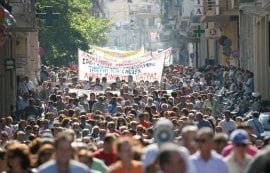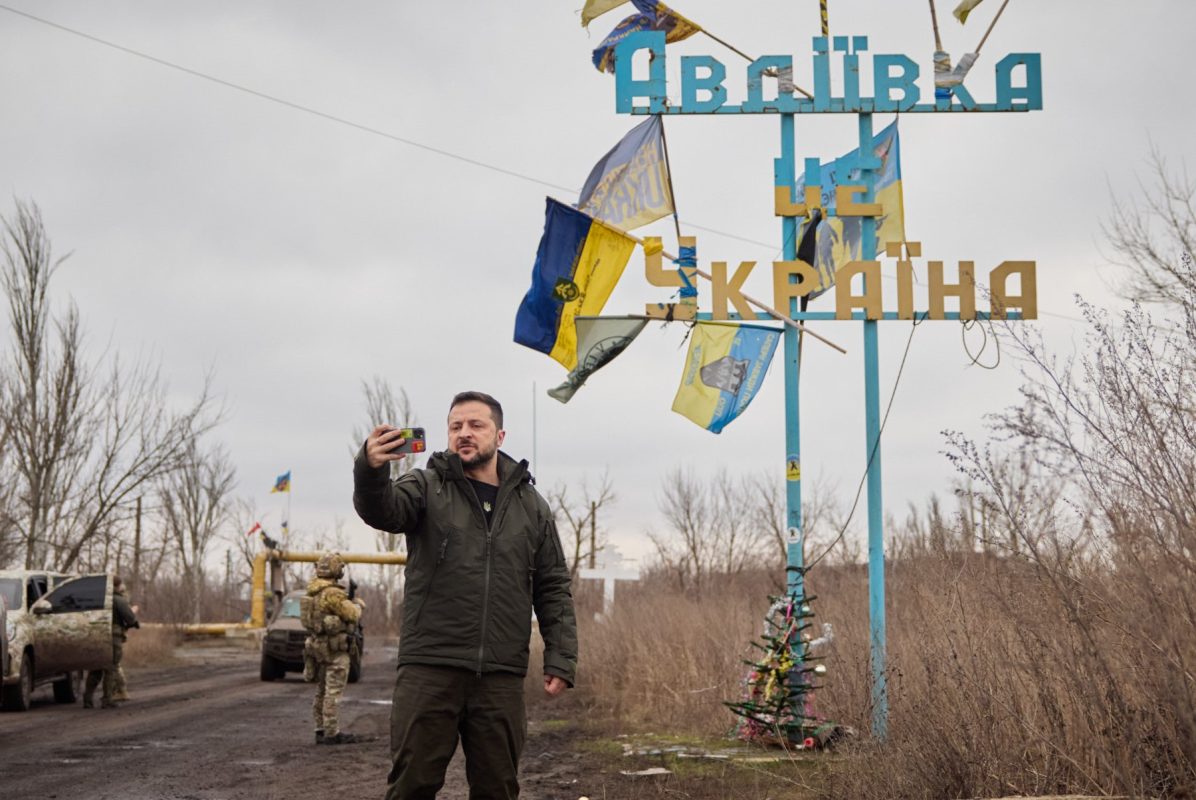At this year’s IMT World School, held in Greece, Socialist Appeal supporter and member of SYRIZA London, Stella Christou, spoke to Stamatis Karagiannopoulos, member of the Communist Tendency of SYRIZA, about the economic, social, and political situation facing workers and youth in Greece today. We publish here a transcipt of this interview.
At this year’s IMT World School, held in Greece, Socialist Appeal supporter and member of SYRIZA London, Stella Christou, spoke to Stamatis Karagiannopoulos, member of the Communist Tendency of SYRIZA, about the economic, social, and political situation facing workers and youth in Greece today. Stamatis – who has recently been elected onto the Central Committee of SYRIZA – discussed the deep crisis facing Greek capitalism, as well as the nature of the various political parties inside Greece, such as SYRIZA, the KKE, and the Golden Dawn.
Stella Christou: Could you briefly describe the economic situation in Greece at the moment?
Stamatis Karagiannopoulos: Greek capitalism today is in a state of an absolute impasse, at all levels: financial, social and political. We are in the sixth year of a deep recession. The total fall of the GDP is 25% from 2008, from 240bn euros to 180bn euros.The western imperialists are talking about the “salvation” of the Greek people from the threat of big debt and the guarantee of the wages and pensions of the Greek people. But the reality is showing the opposite.
It is not very difficult to conclude that with such a deep recession and such a colossal continuous robbery of the working masses from the banks. Greece is getting closer and closer to an open bankruptcy and a probable exit from eurozone.The Greek state must pay until 2016, for the interest and renewal of bonds, 105bn euros in total.
The Samaras government [a coalition led by Greek Prime Minister Antonis Samaras] hopes that after the German elections, the German bourgeoisie will offer a new big “haircut” in Greece and a new loan. But as the recession is deepening all over Europe, Germany cannot support such a generous offer. And this means that there is no solution for the salvation of millions of Greeks other than to cancel the debt and to nationalise the monopolies, implementing a democratically planed economy.
SC: What are the impacts of the crisis on living standards?
SK: The unemployment in Greece is 30% and 1.5 million people are unemployed. This percentage is bigger than the most African countries.
Since 2008 the living standards of the working class have been reduced by 50% in general and one million jobs have been lost. Four million Greeks, in a population of 11 million, lives beyond the poverty line and 450,000 families have no any monthly income.
300,000 people live without electricity and because of the austerity measures the life expectancy has fallen by between 7-8 years.
SC: Greece has a very revolutionary history. What are the historical traditions of the Greek working class?
SK: Within the heroic history of the world labour movement, the Greek labor movement has gained a special position, as a result of its revolutionary traditions.
These traditions are the product of a weak capitalism, dependent on foreign capital; a capitalism that in order to avoid its overthrow, was compelled to govern with Bonapartist [dictatorial] regimes.
Historically, Greece was not characterised by its ‘social’ or ‘welfare’ state, but by state bankruptcies and dictatorships. From 1830, the starting point of the Greek state, until the Second World War, Greece faced three official state bankruptcies. From its first steps onto the historical scene at the beginning of the previous century until the decade of 1980’s, the Greek labour movement could have taken power six times.
These revolutionary traditions in Greece have deep roots and the communist movement has in turn managed to sustain them and strenghten them within the working class; roots so strong that Stalinism, with all its crimes and betrayals, failed to destroy.
After Metaxas’ dictatorship in 1936, and inbetween as well as after the junta of 1974, Greece suffered a series of Bonapartist regimes. Moreover, the last 30 years of relatively stable bourgeois parliamentarian democracy, without any openly revolutionary situation, represented a historical exception for Greece.
This period was the product of capitalist stabilisation internationally, with the growth of western capitalism and at its corresponding social reforms, as well as the of the growth of Greek capitalism itself, which was prolonged after the 90’s with the help of the cheap credit and the overexploitation of hundred thousands of immigrants from eastern Europe.
Throughout this period, as a result of the existence of a strong and left working class with powerful mass organizations, the bourgeoisie was compelled to lean on the reformists of PASOK [the Panhellenic Socialist Movement] and postpone any Bonapartist alternative until the distant future.
But all that we have seen in Greece in the last three years proved clearly that we must forget the Greece of the stable bourgeois democracy, and that – after 30 years of an historical parenthesis – we are returning rapidly to the Greece of revolution and of extreme political instability.
SC: How would you describe the political situation in Greece today? What are tasks facing the movement of workers and youth?
SK: After the mass movement in the squares in 2011, we would characterise the period in Greece as “pre-revolutionary”. On this question we must be careful and not have a schematic and scholastic approach.
There is no “Great Wall of China” that separates a pre-revolutionary period from an open revolutionary situation.
There were at least four times in the last three years (summer 2011, October 2011, February 2012 and November 2012) in which we saw the three conditions of a revolutionary situation – as Lenin and Trotsky explain them – develop:
- Crisis and confusion among the ruling class
- Radicalisation of the petit bourgeoisie [the middle classes]
- A working class ready for revolutionary action
It was only the lack of revolutionary leadership and – to be more precise – the actions of the existing trade union and political leadership, which acted as colossal barriers; those were the reasons for which the masses have not realised their revolutionary force yet.
In Greece we have the use of a peculiar tool for the prevention of the masses’ militancy. This tool, apparently, is the use of 24- and 48-hour general strikes without any continuation.
Whenever the class struggle arrives at a boiling point, the trade union bureaucracy calls for a 24- or 48- hour general strike without any concrete perspective of continuation. So far we’ve had 29 days of such general strikes, including four 48-hour general strikes.
This tactic has squandered the fighting potential of the masses and discredited the method of the general strike in the eyes of the workers.
In a deep crisis like that which we have in Greece, in a deep recession where production is at a very low level, where not only the Greek bourgeoisie but also a coalition of the main imperialist powers are attacking the Greek working class, one 24-hour general strike, which in reality means a day of demonstration, is like the “sting of a fly to an elephant”.
As a worker told us in one of the last general strikes, expressing the widespread support of an all-out political general strike among the working class, “if in the beginning of the crisis, at a time where the working class had some reserves, if we had then concentrated only half of the 29 days of general strike in a period of month, today the balance of forces could have been completely different”.
And if before the elections in June 2012 the main barrier was the PASOK trade union bureaucracy, after the elections up until now, the main responsibility is the SYRIZA [the Coalition of the Radical Left] leadership.
SC: So how and why is this destructive policy of SYRIZA being realised?
SK: The passive policy and tactics of the SYRIZA leadership have lead the struggle to an impasse and disappointed the workers.
Let’s give some examples:
- In November 2012, under the pressure of the 48-hour general strike, the SYRIZA leadership spoke for the “democratic overthrow” of the government. But the workers did not listen or see anything in this direction and went back to their homes.
- Last May when thousand of teachers responded to the referendum with a 90% vote for an “all-out strike” against the attempt of the government to forbid their struggle, SYRIZA unionists decided to overrule the teachers decision from the top.
- In the recent massive movement against the closure of ERT [the state broadcasting station], all 12 Federations decided to support a political “all-out general strike”, but the SYRIZA leadership refused to support this decision.
This passive and cowardly attitude has multiplied the feeling of desperation among the masses.
SC: What is the particular stage of the class struggle that we are facing now?
SK: On the one hand, we have the heavy burden of desperation and massive unemployment, but on the other hand, we have a deep feeling, especially among the younger layers of the working class that there is no other solution but to fight.
So the only certain thing is that another round of the mass movement is coming soon, and this will probably create an open revolutionary situation.
We have already started to see more occupations in factories and work places than before, initiatives taken by sacked workers. And we are bound to see more of these, as more and more working class people become unemployed.
At the same time, the international bourgeoisie can understand that a storm is coming. The Wall Street Journal wrote on June 24th:
“One more round of lay-offs of civil servants, one more tax increase, one racist murder by the Golden Down [the far-right, neo-fascist party] or the death of a demonstrator from the police could start the violence again.”
SC: What is the situation in trade unions?
SK: The situation in trade unions is contradictory, with many interesting aspects.
The balance of forces at the latest GSEE [the General Confederation of Greek Workers] congress reflected the present distance of the unions from the working class.
But on the other hand, in every workplace where we had elections last year, we see a big turn to the Left in professions such as teachers, nurses, doctors, shipyards, electricians, etc.
This turn reflects the massive shift in the balance of forces that will take place in the trade unions over the next period.
SC: And what about the youth?
SK: An extremely important question, since the level of youth unemployment is 60%. Over the past three years (with the exception of the summer 2011) we have not seen any decisive move of the big majority of youth (school students, university students, the unemployed, etc.) and in the strikes that we had, the older generation was “setting the tone”.
In the demonstrations of the last period we have seen that it is easier to take the contact details of an older worker than of a young student or a young worker.
On the other hand, the opinion polls show that SYRIZA in June 2012 gained its greatest support among the university students (39%) and among the age group of 18-24 (37%). In the one year since the start of the SYRIZA turn to the right, this percentage has been reduced to 27%.
So we have a youth which is very suspicious of all the traditional parties and organisations, but is looking to the Left for political solutions.
It is not difficult to predict that the youth will be the layer which will set its stamp on the new round of class struggle in Greece, and that is why we must approach the youth with an open revolutionary banner.
SC: What is the state of the current coalition government? What is the strategy of the Greek ruling class in this situation?
SK: In the process of the crisis the bourgeoisie burned all their main political cards. The Greek ruling class today doesn’t have a popular party or a bourgeois politician to do the “dirty work” with any stability or for any duration.
The Samaras government, composed of New Democracy [a right wing, bourgeois party] and PASOK since DIMAR (the right split of SYNASPISMOS in 2010), is very fragile and is sitting on top of an unresolved crisis, facing a new round of massive struggle, resulting from the refusal of Germany to offer a new loan and a new haircut on the debt. This government is expected to collapse very soon.
And as every day passes, the Greek bourgeoisie became more and more comforable with the idea of sustaining their power through a coalition with either SYRIZA or the Golden Dawn.
The most likely immediate perspective, after the inevitable fall of Samaras’ government, will be an electoral victory of SYRIZA and a government with this party as the main political force, supported by DIMAR, PASOK or the “Independent Greeks”, a populist split from New Democracy formed in 2011.
In such a scenario, and due to the extreme pressures from the bourgeoisie and the troika on the one hand and from the working class on the other, we will have to anticipate deep crises in the government and serious splits within SYRIZA.
In addition, the failure of such a government could bring a right-wing government coalition to power, which would include the Golden Dawn.
SC: What is your analysis of Golden Dawn? What are the reasons behind its rise in popularity and influence?
SK: Golden Dawn (GD) is a neo-Nazi organisation, not a common extreme-right bourgeois formation, such as Le Pen’s National Front in France or the Northern League in Italy. GD was the creation of fascist elements inside the Greek police and the Greek army from the early 80s.
The founding goal of GD was not to become a massive party, but to bring together all the fascist elements of the state and of the lumpenised youth into a paramilitary force which could play a certain role in a counter-revolutionary revolt. The founders of GD, thus, never really had a perspective for massive influence.
Despite all the hysterical exaggerations of the small left groups and the petty bourgeois left intellectuals, we must highlight the following:
- GD is not a massive party. It is composed of a maximum of 2,500 – 3.000 members and active supporters.
- GD is not representative of a mass movement and it cannot be comparable to the Nazi party in Germany in the 1930s. Most of the attempts of GD to organise open rallies were cancelled due to the intervention of massive left anti-fascist rallies, as happened one week ago with the cancelation of the GD festival in Kalamata.
- GD’s rise is not the product of the “turn of the society towards fascism” as the left intellectuals say, but the result of the collapse of the bourgeois political parties. A vote for GD today does not mean a decision by people for an active mobilisation against the labour movement, but is an extremely backward and blind way of passively protesting against the corruption of the bourgeois political system.
Our perspectives regarding the GD, do not involve the its certain conquest of power as the small left groups predict. This is mainly because of the urgent need of the bourgeoisie to find a political partner for a new right-wing bourgeois coalition government. Already, leading members of the New Democracy (ND have) officially stated that the party must collaborate with the GD.
ND’s perspective could, of course, create a form of parliamentary Bonapartism, but on the grounds of today’s deep capitalist crisis this would not be stable. Such a government would, sooner or later, produce an even more massive turn to the left, primarily radicalising the youth.
The second reason is that GD does not have the necessary reserves of support in society.
The petty bourgeoisie – the classical social reserve of reaction – is no longer the majority of the population. In the 70s, 60% of the Greek population were peasants. In Greece today, 60% of the population lives in Greece’s two main cities, Athens and Thesaloniki.
The active working class is composed of 2.5 million people while 1.5 million are unemployed. If we add children, pensioners, houswives and the illegal immigrants, we have an absolute majority for the working class in the population. The perspective for the foreseen future is not a fascist or Bonapartist power under GD, but the participation of GD in a bourgeois coalition government.
SC: What is SYRIZA? What are the reasons behind its growth?
SK: SYRIZA is a mass party mainly composed of two different right wing splits from the KKE – the Greek Communist Party – in the past: the split under the title “KKE of interior” in 1968, composed of the majority of the KKE non-exiled leading members; and the split of KKE just after the collapse of Stalinism in 1991.
SYRIZA is a workers’ party. It is supported by a big section of the working class, but it has weak roots among the traditional organisations and movements of the workers and the youth. Moreover, it has very weak party organisations in the trade unions, in the universities, and in neighborhoods.
The rise of SYRIZA was not superficial. It was the result of the total degeneration of the PASOK, in combination with the extreme sectarianism of the KKE.
If the KKE had, not necessarily a Marxist policy, but a policy that would attract the working class, instead of SYRIZA, we would today have the Greek Communist Party.
SC: What is the situation in SYRIZA now? What conclusions can we draw from SYRIZA’s founding congress earlier this summer?
SK: With the present passive, social-democratic policy of Tsipras’ leadership, SYRIZA is completely unable to organise and actively mobilize the masses that voted for the party in the June 2012 elections.
A recent example that highlights this failure was the insignificant turnout in the open party rally, with Tsipras as the main speaker in Syntagma Square, during the days of the mass movement against the closure of the state television last June.
The leadership managed to gather around 15,000 people – a tiny amount compared to the party members in Athens (SYRIZA membership is now 40,000 members, 25,000 of which live in Athens).
The founding SYRIZA congress did not change the balance of forces between the right tendency of Tsipras and the left tendency of Lafazanis (the Left Platform).
The ranks of the party are resisting the social democratic turn of the leading group of Tsipras. The fact that two of our comrades – part of the Communist Tendency in SYRIZA – got elected on the CC [Central Committee of SYRIZA] shows that the potential was there.
Another important element of the congress was the very low level of participation in the pre-congress assemblies, which reflects the absence of enthusiasm for SYRIZA policies amongst ordinary people.
The political character of the Tsipras tendency is that of reformism. It is obvious that, at least at this stage, he is moving to the right – by defending the illusion of a Greek capitalism without austerity inside the eurozone – under the pressure of the bourgeoisie.
On the other side, the Left Platform, is composed of an alliance of soft patriotic Stalinists – the old Left Current of the Synaspismos party- and other small left groups.
The Left Platform is a classic left reformist tendency, which is based on the slogans of “break with the eurozone” and the nationalisation of the banks. In reality, it is not a Left Platform but a Left Amendment to Tsipras’ policy.
The only alternative program that has been presented up until now in front of the eyes of SYRIZA members, is that of the Communist Tendency, the Communist Platform.
SC: What is the situation in the KKE now?
SK: The hard line Stalinists of the new party secretary, Dimitris Koutsoumbas, won the March congress against the Chroutsofite tendency of Nikos Bogiopoulos, a journalist who has proved more popular for SYRIZA members than in the KKE. Bogiopoulos failed even to be elected as a delegate in the congress from his local party branch. The Stalinist Koutsoumbas group has been forced to change the party programme and to abolish officially the “two-stage” theory after 80 years, although the rank-and-file of the party is continuing to defend minimum (reformist) demands and not transitional demands.
This has provoked a small earthquake in the Left, with Bogiopoulos supporters (and also Lafazanis from SYRIZA) accusing the KKE leadership of Trotskyism! This significant change in the program passed in the congress with a majority of 93%!
But of course, KKE has not been transformed into a Trotskyist party. However, this political change is opening new big historical opportunities for genuine Marxist ideas inside the Greek communist movement.
At the moment, many – especially young – militants of KKE are posing the following question: if the “two-stage” theory and all its features (patriotism, etc.) was false, why do we insist in believing that Trotsky’s criticism on Stalinism was totally without any base?
This has created a lot of turmoil within the Communist Party Youth, providing an excellent opportunity for genuinely Marxist ideas. The Communist Party Youth should now be a focus for Marxists; a place where we can find young workers and youth and educate them in Marxism, in the midst of this deepest crisis of capitalism that Greece has ever found itself in.






